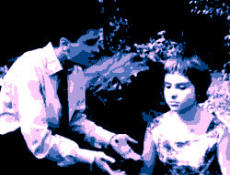Film Review
After the unexpected success of
Maternité clandestine
(1953), Jean Gourguet directed several similar films focused on the
experiences of young people. Of these, the most engaging is
Les Premiers Outrages, a
bittersweet but true-to-life depiction of teenagers coping (pretty
ineptly as it turns out) with their first encounter with love.
Although criminally overlooked today, Gourguet was one of the great
trailblazers of 1950s French cinema, his modest work anticipating the
seismic changes to come with the arrival of the French New Wave at the
end of the decade. Filmed mostly in real locations (in common
with much of Gourguet's work),
Les
Premiers Outrages has a gentle naturalism that calls to mind the films of Marcel Pagnol, the
most obvious influence on Gourguet's cinema.
Although he admired established actors (evidenced by the presence of
Rellys and Louis Seigner in this film), Gourguet had a preference for
inexperienced actors, and it is these fresh-faced newcomers - a fair
number of whom would become well-known in later years - who give his
films their distinctive character. Having debuted in
Maternité clandestine,
Maurice Sarfati proves to be the star of
Les Premiers Outrages, and with an
engaging mix of innocence and rebelliousness he bears an uncanny
resemblance to Jean-Pierre Léaud in Truffaut's
Les 400 coups (1959). If
Sarfati is the likeable hero of the film, the villain is
Françoise Vatel, frighteningly convincing as the mixed up
teenager with obvious psychopathic tendencies.
A decade before her memorable appearance in Luc Moullet's
Brigitte et Brigitte (1966), Vatel
brilliantly evokes the confusion and torment of early adolescence,
although it's nigh on impossible to sympathise with her
character. Having tried to rape Sarfati, she concocts an evil
scheme to disgrace
him and then very nearly drives him to an early grave - there's nothing
deadlier than a teenage girl with the hump. In his first credited
screen role, Marc Michel is scarcely noticed and it would be five years
before he made his next film appearance, in Jacques Becker's
La Trou
(1960), which led Jacques Demy to cast him in his most famous role as
Roland Cassard in
Lola (1961). Jean
Gourguet's eye for talent always served him well and whilst the film
may fall short of perfection in some areas (the narrative is uneven and
a little contrived in places, a musical number seems totally out of
place),
Les Premiers Outrages
is easily redeemed by the unadorned authenticity of the performances.
© James Travers 2015
The above content is owned by frenchfilms.org and must not be copied.
Film Synopsis
In her exercise book, Bichette, a girl in her mid-teens, records her
first amorous experience. The object of her juvenile infatuation
was a handsome lad named Kiki, the son of the innkeeper in the little
village where she spent her summer holidays. Disappointed that
his son has failed his baccalaureate, the innkeeper persuades one of
his neighbours, Monsieur Arnaud, to give him private tuition at his house. This is
how Kiki encounters his first true love, in the form Simone, one of his
tutor's relatives. When she realises that Kiki has no feelings
for her, Bichette wastes no time spreading the rumour that he has spent
the night with an older woman. It is an innocent party, the maid
Françoise, who takes the blame and is sent packing.
Guilt-stricken, Kiki hastens after her but has a close brush with death
when he tries to save her honour...
© James Travers
The above content is owned by frenchfilms.org and must not be copied.



